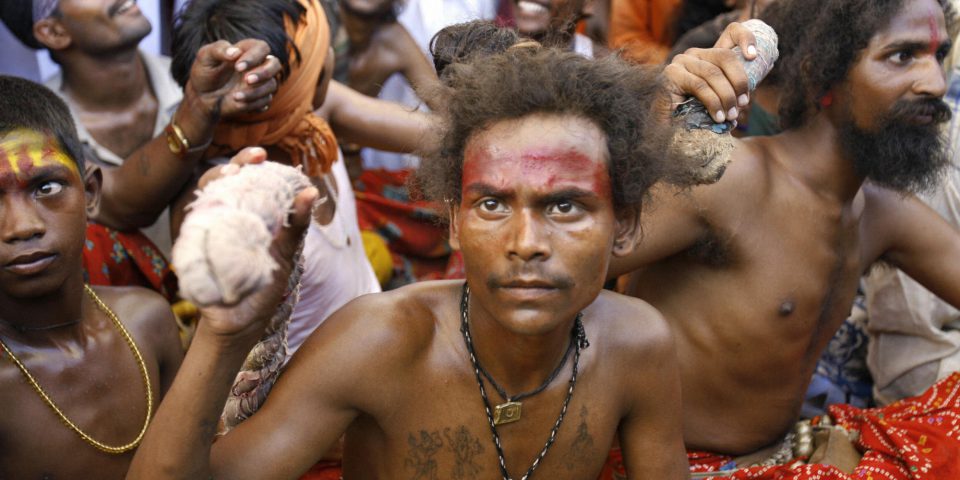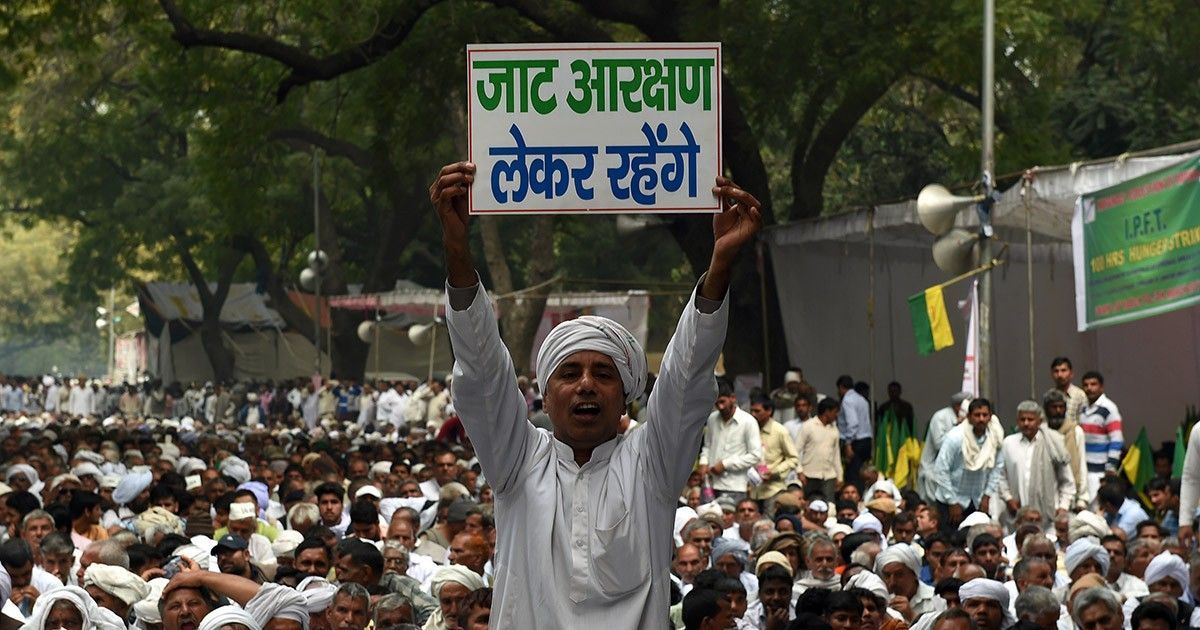


Mumbai, INDIA: Hindu dalits sit during a mass conversion to Buddhism ceremony in Mumbai, 27 May 2007. Thousands of low-caste and tribal Hindus, seeking freedom from oppression in India's heirarchy-ridden caste system, embraced Buddhism in a mass conversion. It is estimated that close to five thousand dalits - who are on the bottom rung of India's anicent caste hierarchy - would have converted to Buddhism during the simple ceremony during which the people recite hymns read out by the monks, following which they are accepted as Buddhists. AFP PHOTO/ Sajjad HUSSAIN (Photo credit should read SAJJAD HUSSAIN/AFP/Getty Images)
The upper castes want to hold on to power and dominate others, writes Nikhat Fatima
Caste system in India, according to a large number of historians and intellectuals began with the advent of the Aryans and is still thriving today in sophisticated forms that common people shrug it off saying, “It is a thing of the past, and does not exist anymore”. For the younger generation caste system means ‘reservations for the dalits’ and we see many youngsters crying hoarse over the coveted seats in professional courses and government jobs. And there are others who think caste system is practiced only in rural India.
But they forget caste system plays a role in choosing a life partner for marriage, in honour killings, where all the menial work (especially manual scavenging) is concerned, in carrying out atrocious activities/ heinous crimes and so on. There are still glaring examples of caste-based discrimination- right from children of upper caste not sharing the same bench in school to educated Dalits being overlooked for promotions in Government departments. Caste system is something that is instilled right from childhood and sadly seems to be taking a more dangerous shape with the upper castes becoming more vocal about their so called superiority with each passing day. The murder of a Dalit youth for merely owning and riding a horse is a glaring example of how the upper caste want to hold on to power and dominate others.

Jats at a protest demanding reservation for government jobs and educational institutions under the OBC category.
While open discrimination is there for everyone to see, it is the subtle one that is hard to recognize if one is not observant enough. One recent personal narration on Facebook by Mohan Guruswamy, a political economist, is about the strong belief of the Brahmins that all fine things such as intelligence, oration, music, arts, craftsmanship, poetry, writing, etc are owned by them and that they are the pioneers and the ones whose responsibility it is to keep it intact.
Guruswamy the only non-Brahmin in the elite group of people gathered at a former Prime Minister’s home for lunch, was an accidental witness to the conversation of all the Brahmins in the group who after crediting themselves for preserving the Hindu arts and culture asserted that it their sole responsibility of not just preserving but also carrying this legacy forward.
The funny part is that everyone in the group thought all were Brahmins and the discussion became personal with the usage of ‘we, us and them”. Of course ‘we’ and ‘us’ meant Brahmins and ‘them’ all others. They had naturally assumed that Mohan Guruswamy with his revered last name, education, intelligence, high post was a Brahmin. This stereotype does not apply just to the Brahmins the rest of the non-Brahmin populace also swear by this stereotype that Brahmins are born with levels of IQ.
And when they learnt they had a non-Brahmin amongst them there was a change in the atmosphere and the warmth they had for Mohan Guruswamy.
However in the same post Mr. Guruswamy shared that when he wrote a piece on the Battle of Rezangla fought on November 18, 1962, about how the C Company of the 13 Kumaon Rifles fought till the last man to hold off a massive Chinese assault and how the C Company of the Kumaonis was entirely drawn from among the Ahirs of Haryana. The Yadav community celebrates November 18th every year with great enthusiasm. And they appreciated this article so much that thousands of copies were printed and disseminated. The Yadav community honoured Mohan Guruswamy for this piece which celebrated their bravery and the Yadav clan concluded that Guruswamy must be a Yadav.
Why else would anyone write about the history of the Yadavs if one were not a yadav himself/herself? Yet another stereotype broken by Mohan Guruswamy. He corrected the Yadav gathering informing them that he was not a Yadav but a Mudiliar. Mudiliar is a caste in the state of Tamil Nadu in South India. The Yadavs were undeterred by this revelation as the President of the Yadav Mahasangh declared Mohan Guruswamy a ‘honorary Yadav’ thus making him as one of their own.
In conclusion Mohan points out that no such honorary Brahmin hood was ever offered to him despite being an intellectual like any of the Brahmins he knew through his work in both the government sector and corporate sector. Brahmin hood is not something that can be given away one has to be born a Brahmin.
This is how the caste system works from the Brahmin point of view, once a top dog always a top dog. While the other 3 castes may reconsider breaking the barriers of the caste system at some point, Brahmins the top notch will never break this rule.
That the Brahmins are highly intelligent than all others is a stereotype which many people would endorse without hesitation.
This article first appeared on twocircles.net